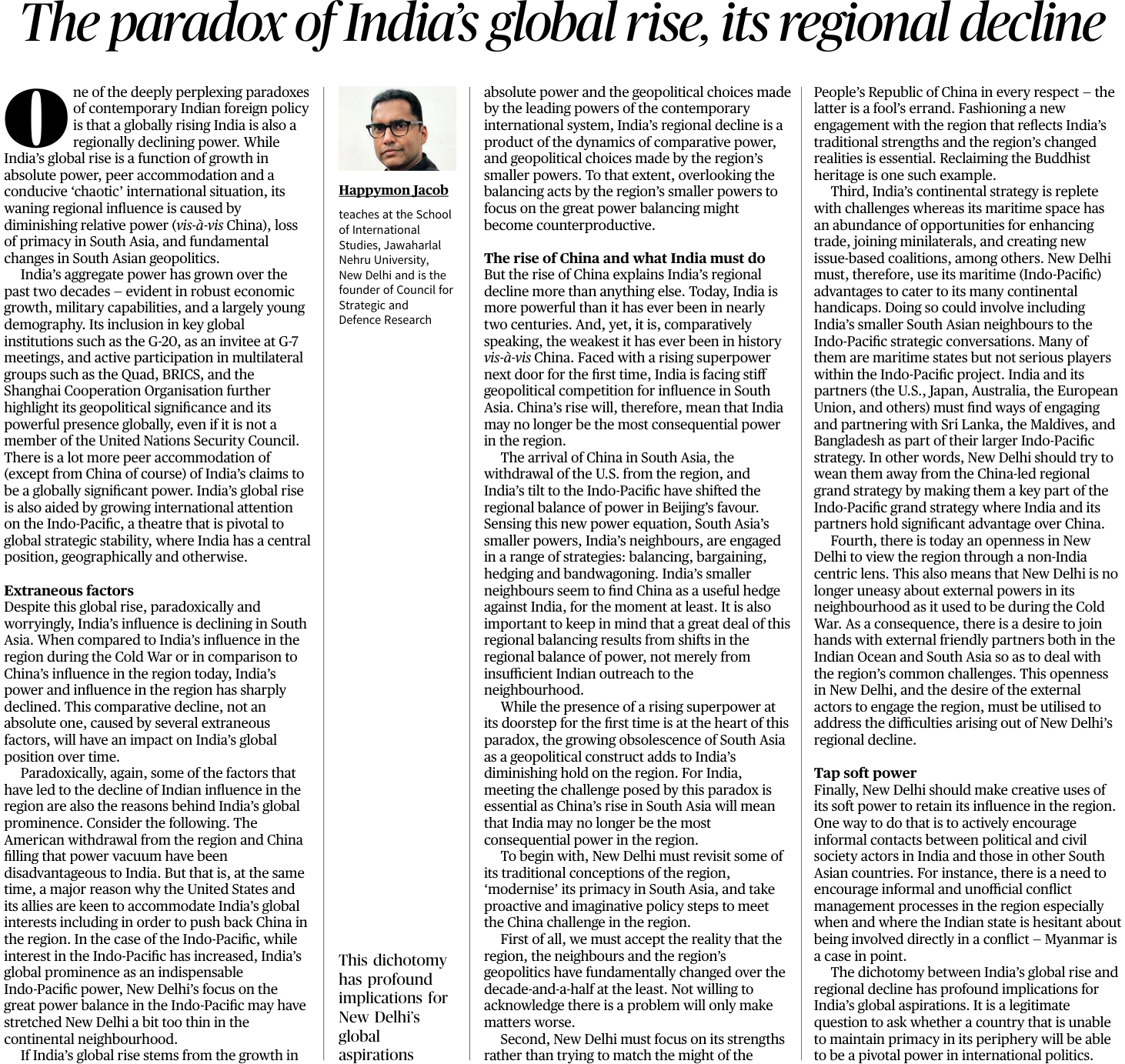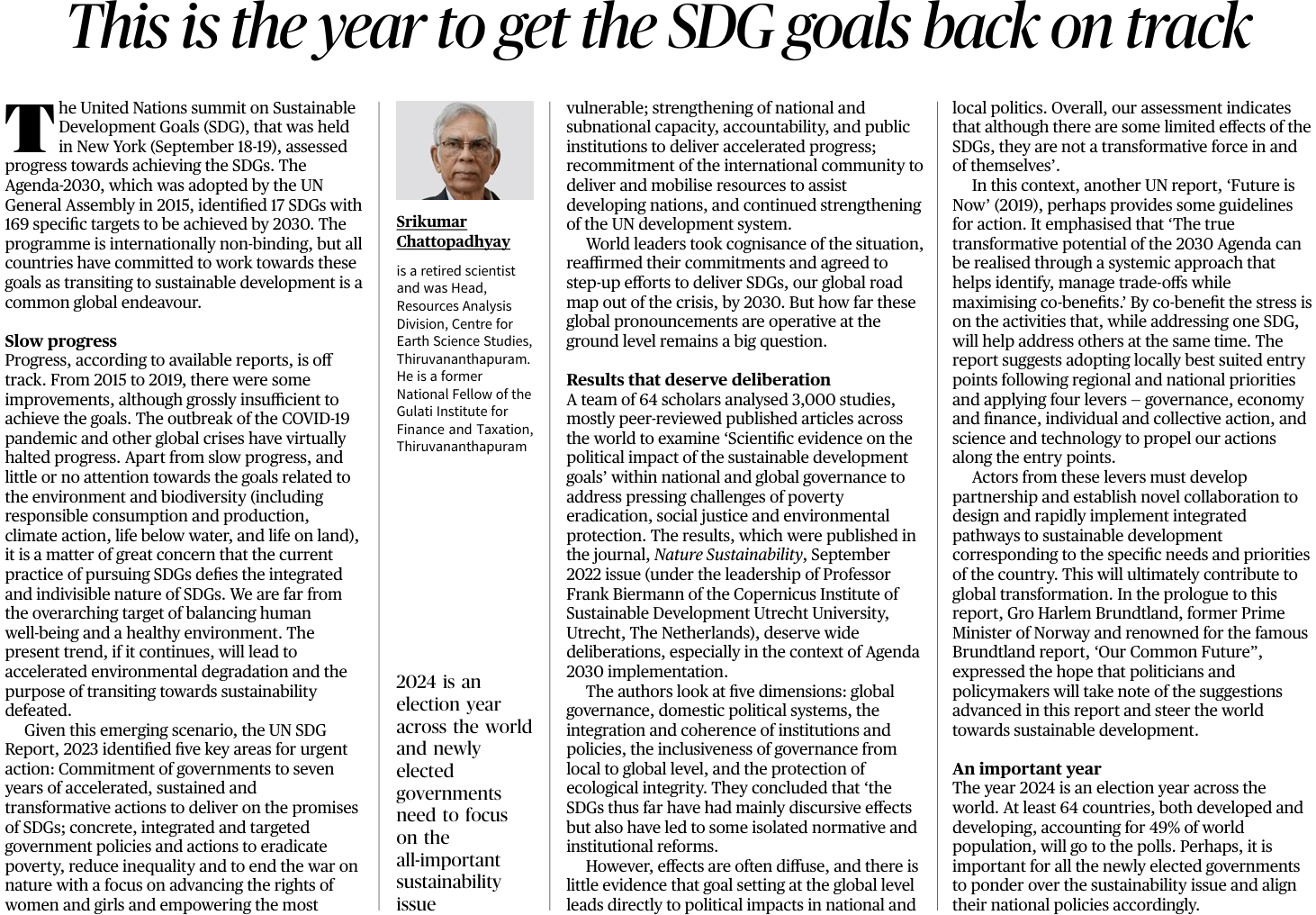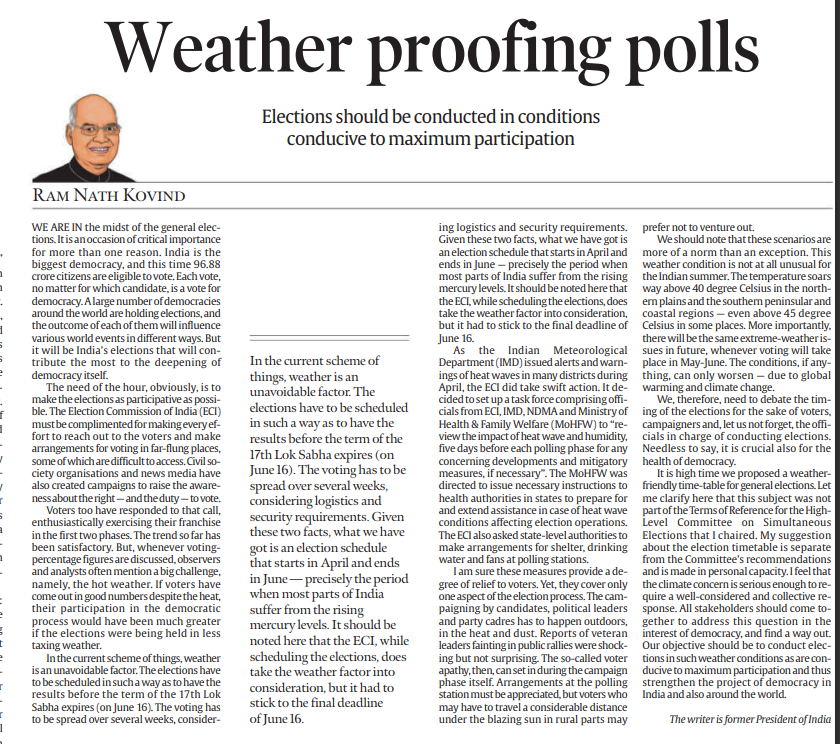 |
|||
| Editorial Analysis
4 May 2024 |
|||
|
The Dichotomy of India’s Global Rise and Regional Decline

Introduction;
The contemporary Indian foreign policy presents a perplexing paradox: while India is experiencing a significant global rise, it is concurrently witnessing a decline in its regional influence, particularly in South Asia.
Global Rise: Absolute Power and Geopolitical Significance;
- India’s global ascension is evident through its robust economic growth, military capabilities, and participation in key global institutions and multilateral groups.
- Its strategic position in the Indo-Pacific further solidifies its global importance.
Extraneous Factors: Regional Decline Amidst Global Prominence;
- Despite its global rise, India’s influence in South Asia has waned, attributed to factors such as the American withdrawal from the region and China’s expanding presence.
- Interestingly, some factors contributing to India’s global prominence, like its focus on the Indo-Pacific, may strain its regional relationships.
Rise of China: Catalyst for India’s Regional Decline;
- China’s ascendancy is the primary driver behind India’s regional decline, altering the balance of power in South Asia.
- India faces competition for influence in the region, prompting neighboring states to adopt various strategies vis-à-vis China.
Strategies for India: Addressing the Paradox;
- To address this paradox, India must reassess its regional strategies.
- This includes acknowledging the changing regional dynamics, leveraging its strengths, particularly in the maritime domain, and engaging with smaller South Asian nations to counterbalance China’s influence.
Leveraging Soft Power and Collaboration;
- India can also utilize its soft power and foster informal contacts to maintain influence in the region.
- Collaborating with external partners and embracing non-India centric perspectives can further address the challenges posed by its regional decline.
Implications;
- The disparity between India’s global rise and regional decline raises questions about its ability to maintain pivotal power status in international politics.
- Addressing this paradox is crucial for India’s long-term global aspirations.
Conclusion;
India’s foreign policy faces a complex interplay between its global aspirations and regional dynamics, necessitating adaptive strategies to navigate this dichotomy effectively.
Assessing Progress and Action Plans for Sustainable Development Goals (SDGs)

Introduction;
The United Nations summit on Sustainable Development Goals (SDGs) in New York reviewed progress towards achieving the 17 SDGs outlined in Agenda 2030, highlighting slow progress and the need for urgent action amidst global crises.
Slow Progress and Concerns;
- Reports indicate that progress towards SDGs is off track, with the COVID-19 pandemic exacerbating challenges.
- Notably, environmental and biodiversity-related goals are receiving inadequate attention, threatening environmental sustainability
Key Areas for Urgent Action;
The UN SDG Report, 2023, identifies five crucial areas for immediate action, including government commitment, integrated policies, capacity strengthening, international cooperation, and UN system reinforcement, to accelerate progress towards SDGs.
Political Impact and Transformative Potential;
- Scholarly analysis of SDGs’ political impact suggests limited transformative effects, mainly discursive, with isolated normative and institutional reforms.
- However, there’s little evidence of direct political impacts at national and local levels.
Leveraging Systemic Approaches;
- The ‘Future is Now’ report emphasizes a systemic approach to realize the transformative potential of Agenda 2030, advocating for managing trade-offs and maximizing co-benefits across SDGs.
- It highlights governance, economy, individual and collective action, and science and technology as levers for sustainable development.
Call for Action in Election Year 2024;
With 2024 being an election year in many countries, there’s a crucial opportunity for newly elected governments to prioritize sustainability and align national policies accordingly.
Conclusion;
The need for urgent action to accelerate progress towards SDGs is evident, necessitating integrated approaches, international cooperation, and political commitment. Leveraging systemic approaches and aligning national policies are essential for achieving sustainable development goals globally.
Addressing Weather Challenges in General Elections

Introduction;
- The ongoing general elections in India hold critical significance as the world’s largest democracy, with 96.88 crore eligible voters.
- However, the challenge of hot weather poses a significant obstacle to voter turnout and overall democratic participation.
Enhancing Participation Efforts;
- Efforts by the Election Commission of India (ECI), civil society organizations, and media campaigns aim to enhance voter awareness and participation.
- Despite these initiatives, the hot weather remains a formidable challenge to voter turnout.
Weather Considerations in Election Scheduling;
- The election schedule, spanning from April to June, aligns with logistical and security requirements while ensuring results before the term of the 17th Lok Sabha expires.
- However, this period coincides with rising temperatures across India, affecting voter participation.
Mitigating Heat Wave Impact;
- The ECI, in collaboration with relevant authorities, takes proactive measures to mitigate the impact of heat waves on election operations.
- Setting up a task force, issuing alerts, and ensuring arrangements for shelter, water, and fans at polling stations alleviate voter discomfort to some extent.
Challenges Beyond Polling Stations;
- While polling station arrangements provide relief, outdoor campaigning exposes candidates, political leaders, and party cadres to heat-related risks.
- Voter apathy may set in during the campaign phase, particularly in rural areas with considerable travel distances.
Long-term Climate Concerns;
- Extreme weather conditions during elections are not uncommon in India, with temperatures exceeding 40-45 degrees Celsius in various regions.
- With global warming and climate change exacerbating these conditions, addressing weather challenges becomes imperative for future elections.
Proposal for Weather-Friendly Election Timetable;
- A weather-friendly election timetable is proposed to enhance voter participation and strengthen democracy.
- While not part of existing recommendations, addressing climate concerns requires a collective response from all stakeholders to ensure optimal democratic processes.
Conclusion;
Addressing weather challenges in general elections is crucial for maximizing voter participation and upholding democratic values. Collaborative efforts are needed to devise strategies that prioritize voter comfort and contribute to the health of democracy in India and globally.

